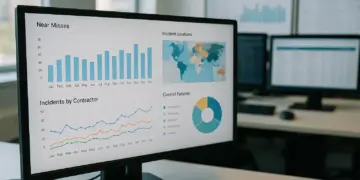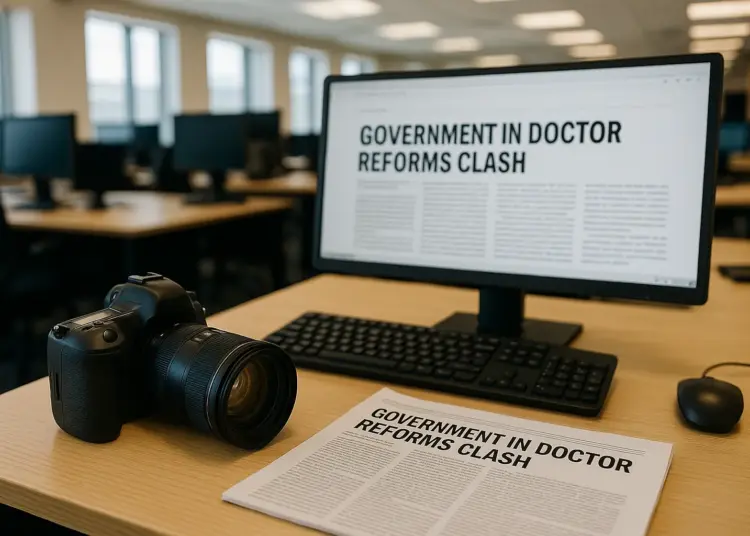Story Highlight
– BMA leaders accused of turning organization into a farce.
– GPs urged to refuse new online access requirements.
– Kinnock warns motion risks patient safety during winter.
– Majority of GPs concerned about safety since mandates started.
– Tensions rise between BMA and government over pay disputes.
Full Story
Health Minister Stephen Kinnock has expressed strong criticism towards the leadership of the British Medical Association (BMA), accusing them of undermining the organisation’s credibility. This comes in the wake of a recently passed motion by the BMA that advocates for General Practitioners (GPs) to disregard new online access requirements set by the government.
As of October 1, GP practices across England are mandated to keep their digital consultation platforms operational throughout their working hours. This includes managing requests for non-urgent appointments, medication inquiries, and administrative matters. However, during the England Local Medical Committee (LMC) conference last Friday, BMA members voted to demand the abolition of these requirements, insisting that online consultations should halt once a practice’s safe working capacity has been reached.
The motion raised significant concerns, labelling the government’s changes a “cynical political stunt” that lacks proper funding and is unfeasible amid a precarious workforce situation. In response to the motion, there are calls for the BMA’s GP committee for England to consider further actions, including non-compliance with the mandates if the government refuses to amend them.
Kinnock, defending the government’s position, stated, “The current leadership of the BMA, whether on the GP committee or resident doctors’ committee, seem determined to turn their organisation into a farce.” He reiterated the government’s commitment to collaborate with the BMA but stressed that the leadership’s stance obstructs necessary improvements in patient care and undermines the aspirations of its members. “This latest escalation is founded on untruths and will put patient safety at risk at a critical time ahead of winter,” Kinnock added.
He further emphasised the government’s dedication to general practice, noting that GPs are a central focus of the long-term health strategy. “We have placed GPs at the heart of our 10-year health plan, provided a funding boost of £1.1 billion, recruited 2,500 more GPs, and cut red tape—the measures taken underscore our commitment,” Kinnock stated.
The tensions arise amid an ongoing pay dispute between the BMA and the Labour government, with the union asserting that salaries for resident doctors have declined by 20% in real terms since 2008. Many doctors are reportedly facing significant employment challenges. Labour’s Wes Streeting, offering a new support strategy to resident doctors last week, has remained firm on salary matters, labelling the BMA’s pay demands as “preposterous.” The BMA, however, rejected the recent offer, arguing it falls short of what is necessary for fair remuneration.
Concerns regarding the new mandates have been echoed by various GPs and practice managers, with a poll indicating that 67% of respondents expressed worry about potential risks to patient safety linked to the online access requirements. The recent changes have prompted reports of patients submitting requests regarding serious conditions through non-urgent forms, raising alarms among family doctors.
Practices have faced challenges as patients detail serious issues—such as difficulty breathing, rectal bleeding, and severe vomiting—using forms intended for less critical matters. GPs have voiced that these requirements shift focus away from essential patient care, reducing the ability to respond effectively to urgent health needs.
Additionally, the BMA has pointed out that adequate safeguards have not been instated to support the transition to the new online system, alongside a lack of additional staffing to manage the increased volume of requests. The fear is that the necessity to sift through online submissions will consume too much time, potentially jeopardising patient safety.
Dr Tom Dolphin, chair of the BMA council, articulated concerns over the disconnect between healthcare professionals and governmental decision-makers. “As representatives for doctors across the UK, we care deeply about our patients,” he noted. “Doctors’ ability to provide the quality of care patients deserve relies on support from and collaboration with the government and NHS leaders.” He added that there exists a significant divide between the realities faced by doctors delivering care daily and the policymakers in Whitehall.
“This collaboration must be built on trust and conducted through genuine, direct engagement,” he said. “Our GP committee continually warned the government that making unkeepable promises regarding online access would push practices to their limits, reduce appointment availability, and risk urgent inquiries being overlooked.” Following the frustrations voiced during the LMC conference, Dolphin asserted the desire to work constructively with the government to address these growing disputes for the benefit of all involved.























Patient safety must come first, but digital access should not be imposed in a way that overlooks capacity and workload. Mandating online systems without adequate funding, staff and training risks creating new safety hazards through delays, administrative errors and reduced continuity of care. Constructive discussion is needed between government and clinicians to set realistic requirements, invest in technology and workforce resilience, and monitor outcomes so that digital tools enhance rather than undermine care.
Patient safety must come first, but so must workable policy. Forcing rapid implementation of online access without addressing staffing, training and IT resilience risks creating new safety issues and widening health inequalities. Constructive dialogue between government and the profession, backed by realistic timelines and targeted investment in workforce and systems, would better protect patients than public confrontations.
The focus should always be on patient safety and workable delivery. Forcing rapid changes without ensuring practices have the staff, time and IT resilience to implement them risks adding pressure and creating safety gaps. Any digital access programme must be accompanied by realistic workforce plans, adequate funding for infrastructure and training, clear clinical governance and contingency arrangements for increased demand. Constructive dialogue between government and clinicians is essential so changes are safe, practicable and supported on the frontline.
Patient safety must come first but so must realistic implementation. Forcing new digital access requirements without ensuring adequate staffing, training and reliable IT risks increasing delays and errors rather than improving care. If the aim is better access and efficiency, the solution is proper resourcing, clear standards, and phased roll out with clinician input, not punitive measures. Constructive dialogue between government and clinicians will protect patients far more effectively than public confrontation.